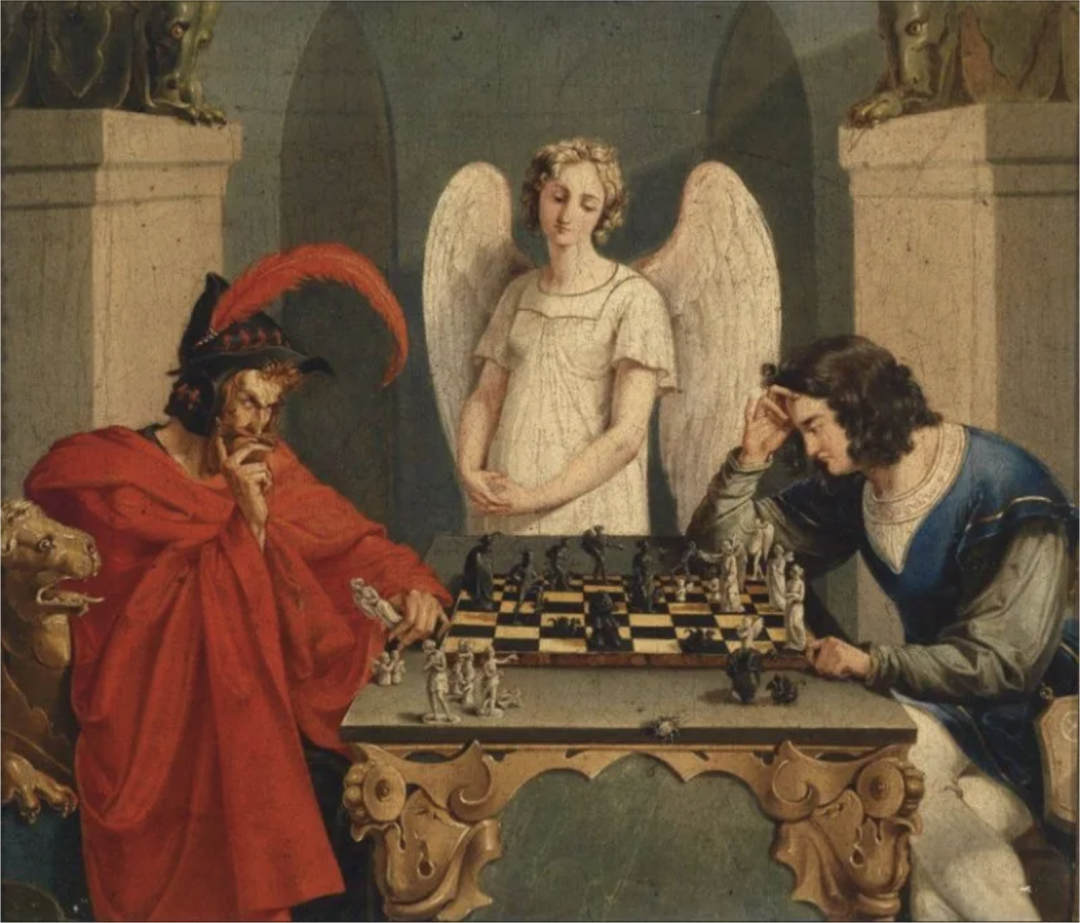
“For the creation waits with eager longing for the revealing of the sons of God”
Friedrich Moritz August Retzsch’s painting entitled Die Schachspieler,
or “The Chess Players” in english, is a renown 19th-century work of art
depicting a chess game between a man and the devil in the forefront
with an angel clasping hands in the background.
The man appears to be burdened by worry as his right hand grips his forehead
and his defeated eyes fixate on the board. The devil on the other hand fixates his eyes
on the man, holding the bottom part of his face as though concealing a truth.
The angel’s head is slightly tilted towards the man with a plain face
and lowered eyes on the man’s side of the board. The stakes are high. The man’s very life. Emblematic of the Romantic-artistic tradition, the painting meddles with Nature, beauty,
and the supernatural, and the chessboard which centers the painting,
both separating and joining the devil and man, beautifully represents life
and the moves we have to make with its respective consequences.
When interpreting Retzsch’s painting,
many reference his fascination with Goethe’s Faust,
a play adapted from a German legend about a bet
between the devil and God that Faust,
a man consumed with the desire to learn all that could be learned,
could be lured away from righteousness.
The colors in the painting are neutral,
all except for the devil's bright red
and the man’s cool blue.
It seems we are all meant to fixate on the chess game,
on the man, even the gothic statues within the painting stare in anticipation.
All seem to ask him, “what is your next move?”
Due to the power dynamic portrayed by their body languages
and the arrangements of the pieces on the chessboard,
many have retitled the painting, “checkmate,”
denoting the devil’s inevitable victory over Man,
as is the case in Faust’s legend,
but the story goes that one day a great chess champion
visited the Louvre and upon careful inspection
of the pieces on the chess board,
the champion remarked that the man’s King
still has a move to make which could win him the whole game.
Could it be that the devil’s body language actually tries to conceal his fear that the man will see the possibility of victory? Could the angel’s disposition mean hope? Colossians 2:15 tells us that, “[Jesus] disarmed the rulers and authorities and put them to open shame, by triumphing over them in him,” but as christians, if we go through life without fully understanding the extent to which our King has already defeated the enemy and how he has given us “authority to tread on serpents and scorpions, and over all the power of the enemy, and nothing shall hurt [us],” then just as Hosea writes, “My people are destroyed for lack of knowledge.”
Although the ending of the German legend varies,
in Goethe’s version, Faust is lured away and loses his soul to the devil
only to be saved by God’s grace at the last minute.
Retzsch’s painting tells the same story
and so do our lives if we believe the Gospel.
We can’t beat the devil at his game
but when we realize what our Lord Jesus has done,
our King, and the victory He extends to us as sons and daughters of God,
we don’t have to carry the burden of worry as the man does in the painting.
Just like how every eye in the painting is fixated on the man’s next move, Romans 8:19 tells us that “the creation waits with eager longing for the revealing of the sons of God.” With everything that our Lord has done to save us and make us sons and daughters of God, with all of creation waiting for you, my question is,
what is your next move?
